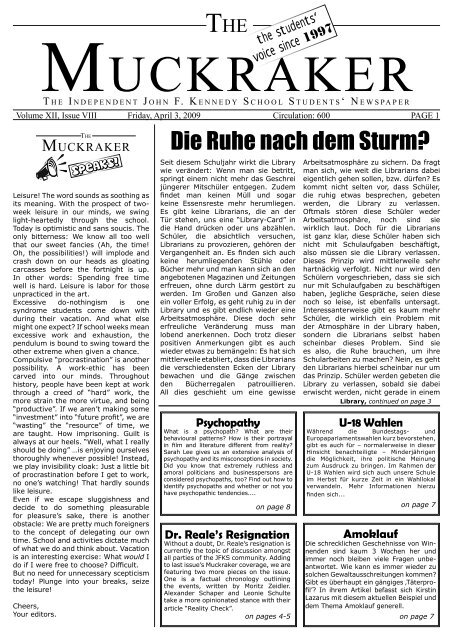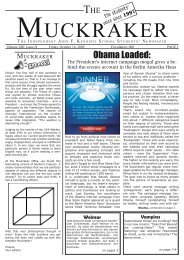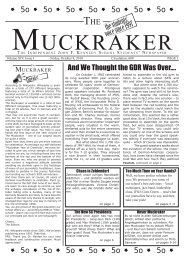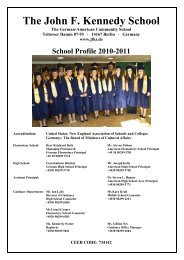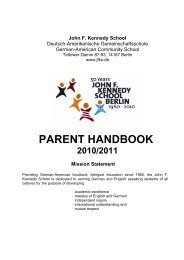MUCKRAKER - John F. Kennedy School
MUCKRAKER - John F. Kennedy School
MUCKRAKER - John F. Kennedy School
You also want an ePaper? Increase the reach of your titles
YUMPU automatically turns print PDFs into web optimized ePapers that Google loves.
Th e<br />
Muc k r a k e r<br />
Speaks!<br />
Th e<br />
the students‘<br />
voice since 1997<br />
Muc k r a k e r<br />
T h e In d e p e n d e n T Jo h n F. ke n n e d y Sc h o o l ST u d e n T S ‘ ne w S p a p e r<br />
Volume XII, Issue VIII Friday, April 3, 2009 Circulation: 600 PAGE 1<br />
Leisure! The word sounds as soothing as<br />
its meaning. With the prospect of twoweek<br />
leisure in our minds, we swing<br />
light-heartedly through the school.<br />
Today is optimistic and sans soucis. The<br />
only bitterness: We know all too well<br />
that our sweet fancies (Ah, the time!<br />
Oh, the possibilities!) will implode and<br />
crash down on our heads as gloating<br />
carcasses before the fortnight is up.<br />
In other words: Spending free time<br />
well is hard. Leisure is labor for those<br />
unpracticed in the art.<br />
Excessive do-nothingism is one<br />
syndrome students come down with<br />
during their vacation. And what else<br />
might one expect? If school weeks mean<br />
excessive work and exhaustion, the<br />
pendulum is bound to swing toward the<br />
other extreme when given a chance.<br />
Compulsive “procrastination” is another<br />
possibility. A work-ethic has been<br />
carved into our minds. Throughout<br />
history, people have been kept at work<br />
through a creed of “hard” work, the<br />
more strain the more virtue, and being<br />
“productive”. If we aren’t making some<br />
“investment” into “future profit”, we are<br />
“wasting” the “resource” of time, we<br />
are taught. How imprisoning. Guilt is<br />
always at our heels. “Well, what I really<br />
should be doing” …is enjoying ourselves<br />
thoroughly whenever possible! Instead,<br />
we play invisibility cloak: Just a little bit<br />
of procrastination before I get to work,<br />
no one’s watching! That hardly sounds<br />
like leisure.<br />
Even if we escape sluggishness and<br />
decide to do something pleasurable<br />
for pleasure’s sake, there is another<br />
obstacle: We are pretty much foreigners<br />
to the concept of delegating our own<br />
time. <strong>School</strong> and activities dictate much<br />
of what we do and think about. Vacation<br />
is an interesting exercise: What would I<br />
do if I were free to choose? Difficult.<br />
But no need for unnecessary scepticism<br />
today! Plunge into your breaks, seize<br />
the leisure!<br />
Cheers,<br />
Your editors.<br />
Die Ruhe nach dem Sturm?<br />
Seit diesem Schuljahr wirkt die Library<br />
wie verändert: Wenn man sie betritt,<br />
springt einem nicht mehr das Geschrei<br />
jüngerer Mitschüler entgegen. Zudem<br />
findet man keinen Müll und sogar<br />
keine Essensreste mehr herumliegen.<br />
Es gibt keine Librarians, die an der<br />
Tür stehen, uns eine “Library-Card” in<br />
die Hand drücken oder uns abzählen.<br />
Schüler, die absichtlich versuchen,<br />
Librarians zu provozieren, gehören der<br />
Vergangenheit an. Es finden sich auch<br />
keine herumliegenden Stühle oder<br />
Bücher mehr und man kann sich an den<br />
angebotenen Magazinen und Zeitungen<br />
erfreuen, ohne durch Lärm gestört zu<br />
werden. Im Großen und Ganzen also<br />
ein voller Erfolg, es geht ruhig zu in der<br />
Library und es gibt endlich wieder eine<br />
Arbeitsatmosphäre. Diese doch sehr<br />
erfreuliche Veränderung muss man<br />
lobend anerkennen. Doch trotz dieser<br />
positiven Anmerkungen gibt es auch<br />
wieder etwas zu bemängeln: Es hat sich<br />
mittlerweile etabliert, dass die Librarians<br />
die verschiedensten Ecken der Library<br />
bewachen und die Gänge zwischen<br />
den Bücherregalen patrouillieren.<br />
All dies geschieht um eine gewisse<br />
Psychopathy<br />
What is a psychopath? What are their<br />
behavioural patterns? How is their portrayal<br />
in film and literature different from reality?<br />
Sarah Lee gives us an extensive analysis of<br />
psychopathy and its misconceptions in society.<br />
Did you know that extremely ruthless and<br />
amoral politicians and businesspersons are<br />
considered psychopaths, too? Find out how to<br />
identify psychopaths and whether or not you<br />
have psychopathic tendencies....<br />
on page 8<br />
Dr. Reale’s Resignation<br />
Without a doubt, Dr. Reale’s resignation is<br />
currently the topic of discussion amongst<br />
all parties of the JFKS community. Adding<br />
to last issue’s Muckraker coverage, we are<br />
featuring two more pieces on the issue.<br />
One is a factual chronology outlining<br />
the events, written by Moritz Zeidler.<br />
Alexander Schaper and Leonie Schulte<br />
take a more opinionated stance with their<br />
article “Reality Check”.<br />
on pages 4-5<br />
Arbeitsatmosphäre zu sichern. Da fragt<br />
man sich, wie weit die Librarians dabei<br />
eigentlich gehen sollen, bzw. dürfen? Es<br />
kommt nicht selten vor, dass Schüler,<br />
die ruhig etwas besprechen, gebeten<br />
werden, die Library zu verlassen.<br />
Oftmals stören diese Schüler weder<br />
Arbeitsatmosphäre, noch sind sie<br />
wirklich laut. Doch für die Librarians<br />
ist ganz klar, diese Schüler haben sich<br />
nicht mit Schulaufgaben beschäftigt,<br />
also müssen sie die Library verlassen.<br />
Dieses Prinzip wird mittlerweile sehr<br />
hartnäckig verfolgt. Nicht nur wird den<br />
Schülern vorgeschrieben, dass sie sich<br />
nur mit Schulaufgaben zu beschäftigen<br />
haben, jegliche Gespräche, seien diese<br />
noch so leise, ist ebenfalls untersagt.<br />
Interessanterweise gibt es kaum mehr<br />
Schüler, die wirklich ein Problem mit<br />
der Atmosphäre in der Library haben,<br />
sondern die Librarians selbst haben<br />
scheinbar dieses Problem. Sind sie<br />
es also, die Ruhe brauchen, um ihre<br />
Schularbeiten zu machen? Nein, es geht<br />
den Librarians hierbei scheinbar nur um<br />
das Prinzip. Schüler werden gebeten die<br />
Library zu verlassen, sobald sie dabei<br />
erwischt werden, nicht gerade in einem<br />
Library, continued on page 3<br />
U-18 Wahlen<br />
Während die Bundestags- und<br />
Europaparlamentswahlen kurz bevorstehen,<br />
gibt es auch für – normalerweise in dieser<br />
Hinsicht benachteiligte – Minderjährigen<br />
die Möglichkeit, ihre politische Meinung<br />
zum Ausdruck zu bringen. Im Rahmen der<br />
U-18 Wahlen wird sich auch unsere Schule<br />
im Herbst für kurze Zeit in ein Wahllokal<br />
verwandeln. Mehr Informationen hierzu<br />
finden sich...<br />
on page 7<br />
Amoklauf<br />
Die schrecklichen Geschehnisse von Winnenden<br />
sind kaum 3 Wochen her und<br />
immer noch bleiben viele Fragen unbeantwortet.<br />
Wie kann es immer wieder zu<br />
solchen Gewaltausschreitungen kommen?<br />
Gibt es überhaupt ein gängiges ‚Täterprofil’?<br />
In ihrem Artikel befasst sich Kirstin<br />
Lazarus mit diesem aktuellen Beispiel und<br />
dem Thema Amoklauf generell.<br />
on page 7
Volume XII, Issue VIII Friday, April 3, 2009 Circulation: 600 PAGE 2<br />
JFKS Life<br />
Herr Thiel, Sie sind nun seit Februar<br />
Mathelehrer an unserer Schule.<br />
Ja, Englisch ist mein zweites Fach. Hier<br />
dürfen aber nur „native speakers“ das<br />
Fach Englisch unterrichten, deshalb bin<br />
ich nur Mathelehrer.<br />
Erzählen Sie uns nun Ihre Geschichte:<br />
Wie sind Sie Lehrer geworden?<br />
Ich habe ursprünglich das Fach<br />
Mathematik mit Diplom studiert und<br />
auch abgeschlossen. Ich bin also<br />
Diplom-Mathematiker. Die englische<br />
Sprache kam dann als Hobby dazu, und<br />
dadurch kam die Fächerkombination<br />
zustande. Ich bin immer gern zur<br />
Schule gegangen, daraus entstand<br />
dann der Lehramtswunsch. Mathe war<br />
mein Lieblingsfach, und nach einer<br />
USA-Reise kurz nach dem Fall der<br />
Mauer wollte ich richtig Englisch lernen,<br />
also habe ich es studiert. Also Mathe ist<br />
mein Beruf und Englisch mein Hobby.<br />
Jetzt habe ich sie zusammengeführt.<br />
Dann gefällt Ihnen bestimmt die<br />
amerikanische Atmosphäre?<br />
Mein englischer Hintergrund kommt<br />
natürlich zum Tragen, weil ich mit<br />
englischsprachigen Schülern zu tun<br />
habe.<br />
Was ist Ihr erster Eindruck von JFKS?<br />
Mir gefällt es hier sehr gut. Alles ist sehr<br />
entspannt. Die Schüler sind nett und<br />
sagen „Hallo Herr Thiel!“ im Flur; die<br />
Kollegen sind freundlich und hilfreich,<br />
wir kooperieren... Das sind alles sehr<br />
positive Merkmale der Schule!<br />
Die Frage, die sich natürlich jeder<br />
Schüler erstmal stellt, ist: Wie groß<br />
sind Sie wirklich?<br />
Aha, jetzt muss man berichten…<br />
2,07m.<br />
… Da wird Herr Hoedt aber neidisch!<br />
Aber Sie nutzen sicherlich nicht<br />
Ihre Körpergröße, um Schüler zu<br />
schikanieren?<br />
Ich bin doch viel zu lieb als Lehrer! Da<br />
müssen Sie die Schüler fragen!<br />
Haben Sie eine Philosophie als Lehrer?<br />
Mein Motto ist: Die Schüler sollen<br />
Teacher Feature: Herr Thiel<br />
etwas lernen! Und das Allerwichtigste.<br />
Die Schüler machen wirklich viel im<br />
Unterricht.<br />
Haben Sie schon Unterschiede zwischen<br />
dem deutschen und amerikanischen<br />
Matheunterricht bemerkt?<br />
Für das Aufspüren von Unterschieden<br />
fehlt mir der Einblick in den<br />
amerikanischen Zugang, aber ich kann<br />
sagen, dass es mir persönlich sehr auf<br />
das Verständnis von Zusammenhängen<br />
ankommt, nicht so sehr auf das<br />
Anwenden von fertigen Formeln.<br />
Was tun Sie außerhalb der Schule?<br />
Was sind Ihre Hobbys?<br />
Ein bisschen Sport, also Schwimmen<br />
und Radfahren. Ich gehe auch gerne ins<br />
Kino und gucke die Filme auf Englisch.<br />
Auch ein bisschen Computerzeug, also<br />
programmieren und so.<br />
Wie groß ist die Wahrscheinlichkeit,<br />
sechs Richtige im Lotto zu haben?<br />
Dazu gibt es eine herrliche Geschichte.<br />
Man setzt sich ins Auto und fährt von<br />
Berlin nach Hamburg. Vorher hat<br />
jemand eine Zaunlatte irgendwo an der<br />
Autobahnstrecke positioniert. Und jetzt<br />
fährt man nach Hamburg und schießt<br />
zufällig aus dem Fenster. Wenn man die<br />
Zaunlatte trifft, dann hat man im Lotto<br />
gewonnen. Die Wahrscheinlichkeit ist<br />
ungefähr 1 zu 14 Millionen.<br />
Was würden Sie tun, wenn Sie nun doch<br />
35 Millionen Euro gewonnen hätten?<br />
Ich würde weiter eine halbe Stelle als<br />
Lehrer und dazu sehr teure Hobbys<br />
haben. So was wie eine Segelyacht,<br />
oder Tauchen mit teurem Equipment<br />
und solche Sachen.<br />
Was ist Ihr Lieblingsgebiet in der<br />
Mathematik?<br />
An sich die Analysis, an der<br />
Schule also die Differential- und<br />
Integralrechnung. Aber ich hatte<br />
auch mal eine sehr gute Vorlesung<br />
in Wahrscheinlichkeitsrechnung und<br />
seitdem finde ich dieses Gebiet sehr<br />
nützlich.<br />
Warum ist Grundausbildung in<br />
Mathematik für jeden wichtig?<br />
Hier fällt mir das Problemlösen im<br />
Mathematikunterricht ein. Wenn man<br />
weiß, wie man mathematisch Probleme<br />
löst, dann kann man auch im Alltag<br />
Probleme lösen.<br />
Haben Sie schon mal eine Freudsche<br />
freie Assoziation gemacht? Einfaches<br />
Prinzip: Ich sage ein Wort, und Sie<br />
sagen mir, welches Wort Ihnen dazu<br />
zuerst einfällt. Beispiel: Apollo 13 –<br />
Mond<br />
Isaac Newton – Schwerkraft<br />
Kaninchenzucht – Ich mag Katzen sehr<br />
gern. Kaninchen gibt es traditionell in<br />
meiner Familie zu Weihnachten.<br />
Schokopudding – mit Vanillesoße!<br />
Weibliche Flächen – Das ist mathematisch<br />
hoch komplex! Systeme nichtlinearer,<br />
partieller Differentialgleichungen… und<br />
so weiter.<br />
Lehrerbenotung – Ja, gibt’s das hier?<br />
Teacher evaluation? An meiner alten<br />
Schule gab’s so was, fand ich immer<br />
gut.<br />
Unendlichkeit – Ein faszinierendes<br />
Konstrukt der Mathematik, bei dem<br />
der Mensch an die Grenzen seiner<br />
Vorstellungskraft stößt.<br />
Möchten Sie den Schülern noch eine<br />
Lebensweisheit mitgeben?<br />
Mathematik hat nichts mit rechnen<br />
zu tun, sondern handelt davon, den<br />
Verstand zu benutzen. „Benutze deinen<br />
Verstand!“ wäre also mein Motto.<br />
Das war glaub ich Kants Postulat der<br />
Aufklärung. Und das nicht nur in der<br />
Mathematik, sondern auch im Leben.<br />
Wir danken Ihnen sehr für das<br />
Gespräch!<br />
Comments, Replies?<br />
send your opinions and articles to:<br />
themuckraker@gmail.com<br />
Eileen Wagner
Volume XII, Issue VIII Friday, April 3, 2009 Circulation: 600 PAGE 3<br />
JFKS Life / Column<br />
Library, continued from page 1<br />
Buch vertieft zu sein oder sich nicht die Haare beim Lösen<br />
einer Matheaufgabe zu raufen. Auch bei den Computern<br />
macht sich diese Vorgehensweise bemerkbar: Spiele sind<br />
strengstens untersagt, ebenso Youtube, was z.B. gesperrt ist.<br />
Klar, in einer Stunde, in der sich in der Library verschiedenste<br />
Schüler tummeln und vergeblich nach unbesetzten Computern<br />
suchen, ist diese Maßnahme verständlich. Doch wenn es<br />
mehrere unbenutzte Computer gibt, die Lautstärke an dem<br />
Gerät ausgeschaltet ist und sich niemand beschwert, wieso<br />
darf ein Schüler in seiner Freistunde nicht einmal im Internet<br />
herumsurfen? Abgesehen davon macht sich in letzter Zeit<br />
die sehr harte Linie der Librarians bemerkbar. Computer<br />
werden einfach ausgeschaltet, während Schüler noch daran<br />
sitzen und vielleicht ungespeicherte Programme offen haben.<br />
Es wird wieder diskutiert und Librarians lassen sich auf<br />
Diskussionen über die Student Lounge ein. Diese Ereignisse<br />
erinnern teilweise an die Zustände der letzten Jahre.<br />
Bei weiterem undifferenziertem Vorgehen der Librarians<br />
könnte sich bald wieder ein Konflikt zwischen ihnen und<br />
Twist and Shout!<br />
(And Shout Some More!)<br />
It was 6:20 on the 13th of March, and<br />
inside the House of Youth, the lights in<br />
the small stage-room dimmed. It was<br />
the beginning of the Battle of the Bands,<br />
and the audience cheered as the first<br />
group takes the stage. The first note was<br />
played, and then 2 ½ hours of screaming,<br />
whistling, clapping, foot-stomping, and<br />
jumping up and down followed as the<br />
five bands (Overdrive, Joika, Imprint,<br />
Fenner Reed, and Red Ass Monkeys)<br />
competed for musical superiority. Every<br />
song was played with enthusiasm and<br />
vigor, despite unforseeable trifles such<br />
as tech-problems, broken strings, and<br />
partial nervousness. With a total of 23<br />
(mostly self-created) songs, the bands<br />
made the crowd go wild with their<br />
music, and I myself was acting like an<br />
insane monkey with a firecracker up<br />
my you-know-what. The battle got to a<br />
point when I wondered if the building<br />
would crumble from the sound waves.<br />
Luckily, it didn’t, which meant that the<br />
final election of the winner could take<br />
place. The battle turned into a duel<br />
between Imprint and Fenner Reed, and<br />
the situation in this small, dark, stiflingly<br />
hot room was intense. The system of<br />
voting (whichever band receives the<br />
largest amount of screaming, clapping,<br />
and jumping around wins) led to a<br />
shoutoff that was “epic”, as some people<br />
thought. In the end, Fenner Reed,<br />
with the band members Max Fenner,<br />
Moritz Zeidler, Tom Zylbersztein, Oliver<br />
Groeling, and Nick Schulteeee (he<br />
requested that I write it like that), were<br />
declared the winning band. Even so, I’d<br />
like to tell all the bands that they did a<br />
superb job and that their determination<br />
and enthusiasm made it a great event.<br />
Jakob Marsh<br />
Gibberish. Gibberish doesn’t make<br />
sense. Do these columns ever? They<br />
take time (yours and mine). What<br />
shall I spend time on today? Random.<br />
Random has six letters. Six Facts:<br />
(1) Charles Darwin married his first<br />
cousin, which makes his mother his<br />
wife’s aunt and his father-in-law his<br />
father’s brother-in-law. His sister<br />
also married his wife’s brother, so<br />
his natural sister was also his sisterin-law<br />
and their respective children<br />
were first cousins twice over. The<br />
complications of the matter befuddle<br />
me. (2) Bob Dylan’s real name was<br />
Robert Allen Zimmerman. Or, in<br />
Hebrew, Shabtai Zisel ben Avraham.<br />
He changed it in 1962. I guess Dylan<br />
just looks better on a LP cover. (3)<br />
Fungus is genetically more related<br />
to humans than to plants. Who<br />
knew? (4) Oh, and also: A clove can<br />
cure a toothache. Seriously. Try it.<br />
(5) Marlene Dietrich died May 6th,<br />
1992. Doesn’t that seem very recent<br />
for a star who was an emblem of<br />
another era? I was surprised. (6) If<br />
California were a country, it would<br />
be the 59th largest by area in the<br />
world. There: Six facts. Now, Six of<br />
my favorite words. (1) Flagellum.<br />
(2) Synecdoche. (3) Umbra. (4)<br />
Tenebrific. (5) Fabulator. (6) Smite.<br />
Now I shall name six things to<br />
think about. (1) Legacy. Must it be<br />
accepted or rejected, or can one let<br />
it lie? Can African Americans escape<br />
slavery? Can Jews escape the<br />
Holocaust? (2) Stress. The economy<br />
stressed everyone out. How can that<br />
be, given that it is a product of man?<br />
It’s not like a hurricane; inevitable.<br />
der Schülerschaft entfachen. Schlimmer noch, Schüler und<br />
Librarians könnten sich wieder gegenseitig provozieren und<br />
unnötige Konfrontation suchen. Um vorbeugend zu wirken,<br />
müsste man weniger nach dem Prinzip vorgehen, jeden<br />
Schüler, der nicht offensichtlich mit Schularbeiten beschäftigt<br />
ist, zu ermahnen und/oder zu bitten, die Library zu verlassen.<br />
Die Arbeitsatmosphäre beizubehalten und Störenfriede zu<br />
ermahnen ist natürlich weiterhin wünschenswert und bitter<br />
nötig, doch dies darf nicht als Deckmantel gelten um Schüler,<br />
die nicht stören, hinauszuschicken, nur weil sie keine<br />
Schularbeiten machen. Sicherlich will niemand die bisher<br />
erreichten Zustände verwerfen, und wie sagt man doch so<br />
schön? Einsicht ist der erste Schritt zur Besserung. Nun,<br />
dass die Schüler diese Einsicht mittlerweile gezeigt haben,<br />
ist eindeutig geworden. Auf die Einsicht der Librarians warten<br />
wir noch.<br />
Tenzin Sekhon<br />
Thirteenth of the Nothings<br />
It’s ours. We made it. Why can’t<br />
we control it? And Fashion. There’s<br />
another thing we made that seems<br />
to cause too much stress in too<br />
many people’s lives. (3) Sunshine.<br />
The days are getting longer. That’s<br />
nice. (4) Love and Duty. Which takes<br />
priority? Hollywood says we should<br />
do everything for the one we love,<br />
but what if “everything” goes against<br />
our conscience? This is one of those<br />
hypotheticals you need to figure<br />
out but will hopefully never need.<br />
(5) Free Will. Always can mull over<br />
that one for a while. (6) Chicken.<br />
Or Egg. Or Chicken. Okay now six<br />
important words that start with the<br />
sixth letter of the alphabet. Really<br />
Important Words. (1) Facebook.<br />
(2) Freedom. (3) Friendship. (4)<br />
Fortune. (5) Family. (6) Faith. Hm,<br />
six things with Six? (1) 666 – Devils<br />
Number (2) 6 Degrees of Separation<br />
– some strange theory (3) Page 6 –<br />
where the gossip is (4) 6 Pack – beer<br />
(5) 6 Days of Creation – how long<br />
it took God to make the Universe<br />
(6) 6 Flags – an amusement park.<br />
And finally, the grand finale, six<br />
things you could do after reading<br />
this article: (1) Roll your eyes, (2)<br />
think long and hard about free will,<br />
(3) google if tenebrific is really<br />
a word, (4) move on to the next<br />
article, (5) start paying attention<br />
to your morning class, (6) Sudoku.<br />
Or maybe, just maybe, dismiss this<br />
as a waste of time, and then notice<br />
“waste” has five letters. Five facts…<br />
Anna Zychlinsky
Volume XII, Issue VIII Friday, April 3, 2009 Circulation: 600 PAGE 4<br />
JFKS Life<br />
Muckraking at home II:<br />
All the Principals’ Men<br />
2008, 10th of September – Dr. Reale<br />
orally requests a three-year contract<br />
extension.<br />
5th of November – Mr. Schürmann,<br />
speaking for the Administration, asks<br />
Dr. Reale to withdraw his contract<br />
extension, “in light of the current<br />
situation at the school”.<br />
18th of December – Dr. Reale gives<br />
Mr. Schürmann permission to advertise<br />
his job as a tentative vacancy and to be<br />
replaced as one of the recruiters for the<br />
job fare. Mr. Schürmann accepts and<br />
decides to fly himself.<br />
2009, 7th of January – Dr. Reale tells<br />
the superintendent Mr. Harnos that<br />
he is withdrawing his application for a<br />
contract extension at the beginning of<br />
a meeting where he was to receive his<br />
evaluation.<br />
9th of January – The teachers are<br />
informed by Dr. Reale.<br />
27th of January – The parents are<br />
informed by Dr. Reale.<br />
28th of January – The SC presidents<br />
are informed by a member of the ED.<br />
27th of February – The student body is<br />
informed by The Muckraker.<br />
5th of March – Dr. Reale speaks<br />
at a meeting of the PC attended by<br />
parents, teachers and students in the<br />
elementary school film room. There<br />
were attempts prior to the meeting<br />
to stop him from speaking, but these<br />
were dropped. Looking around the<br />
room, it becomes obvious which group<br />
of people decided to come: Dr. Reale’s<br />
supporters. Loud applause is given to<br />
vigorous statements by Victor Boadum<br />
and Justin Reddig in support of the High<br />
<strong>School</strong> principal, loud murmur arises<br />
when critical questions are asked. “Why<br />
are you so heavily criticized?” someone<br />
dares to ask him. Even though the<br />
audience groans, Dr. Reale replies and<br />
lists several issues: Him coming two<br />
days late to school once after missing<br />
his flight, the controversial concerning<br />
the seating at last year’s graduation,<br />
his unfriendly relationship with the<br />
English department after getting<br />
involved in the discussion around the<br />
English Zentralabitur, his wearing a<br />
police uniform on the anniversary of<br />
9/11. “Making concrete decisions is not<br />
something we do well,” he says about<br />
the school. Few deny that the fact that<br />
he chose to make decisions was one of<br />
the reasons for him being unpopular<br />
amongst his colleagues. Many teachers<br />
see him as being undemocratic and<br />
see his way of making decisions<br />
unprofessional, without consulting the<br />
necessary school organs and find him<br />
difficult to work with in general. It<br />
seems that a majority of the school is<br />
divided on this issue: Everyone is either<br />
pro- or anti-Reale, the school seems<br />
divided by which principal its members<br />
support. Mr. Blount, Director of<br />
Guidance at our school, even speaks of<br />
a “fractured faculty and student body at<br />
JFKS.” There have been accusations of<br />
Dr. Reale being mobbed out of office by<br />
his colleagues, and in turn, accusations<br />
against Dr. Reale that he, in fact, mobbed<br />
teachers. On the 12th of February, Mr.<br />
Blount wrote an E-Mail to the members<br />
of the Parent Council, in which he stated<br />
that “he [Dr. Reale] does not have my<br />
confidence to continue as principal and<br />
I have voiced that to Herr Harnos.”<br />
Many students, however, do not share<br />
the opinion held by many teachers..<br />
Several students voiced their support<br />
for him, praising his help in giving the<br />
students the student lounge, propping<br />
up the IT-department and fighting for<br />
the English Zentralabitur, and a petition<br />
for his staying at the <strong>Kennedy</strong> <strong>School</strong><br />
was passed around amongst students.<br />
10th of March – Mr. Schürmann is<br />
scheduled to speak in front of the PC.<br />
Mr. Harnos adviseds him not to do so,<br />
and that point of order is taken off the<br />
agenda.<br />
13th of March – Mr. Harnos of the<br />
Berlin senate writes an open letter<br />
to the student body, writing that the<br />
decision, whether Dr. Reale is allowed<br />
to stay or has to leave lies with him,<br />
neither with the administration nor with<br />
the student body.<br />
27th-29th of April – Several school<br />
organs are to decide who is to become<br />
the next American High <strong>School</strong> Principal.<br />
Dr. Hepner is one of the candidates.<br />
Ignoring the question of Dr. Reale’s<br />
suitability for his post, there are several<br />
questions we as the members of the<br />
<strong>John</strong> F. <strong>Kennedy</strong> <strong>School</strong> community now<br />
have to ask ourselves. Why does the<br />
fourth principal in a row leave after only<br />
two years in office? Is there something<br />
wrong with the way we choose or treat<br />
our principals? Why are so many people<br />
afraid of publicly voicing their opinion?<br />
Is there something wrong with the way<br />
we approach biculturism?<br />
Moritz Zeidler<br />
-Staff-<br />
Box<br />
Founding Fathers:<br />
Mikolaj Bekasiak<br />
Seth Hepner<br />
Adam Nagorski<br />
Editors:<br />
Ina Fischer<br />
Eileen Wagner<br />
Lena Walther<br />
Layout Editor:<br />
Farsane Tabataba-Vakili<br />
Journalists:<br />
Jung-Hyun An<br />
Natascha Bergh<br />
Aletta Bühler<br />
Lauritz Bühler<br />
Tatiana Bühler<br />
Randolf Carr<br />
Lisa Feklistova<br />
Marissa Fuchs<br />
Mira Godiwala<br />
Joanna He<br />
Nikolas Jaeger<br />
Rebecca Jetter<br />
Max Jürgens<br />
Annette Lazarus<br />
Kirstin Lazarus<br />
Sarah Lee<br />
Stefanie Lehmann<br />
Kim C. v. Schönfeld<br />
Leonie Schulte<br />
Denise Ünal<br />
Katarina von Witzke<br />
Moritz Zeidler<br />
Anna Zychlinsky<br />
Cartoonist:<br />
Jakob Marsh<br />
Guest Journalist:<br />
Alexander Schaper<br />
Tenzin Sekhon<br />
Charlotte von Streit<br />
Th e Mu c k r a k e r is an independent newspaper.<br />
The opinions expressed here in no<br />
way reflect those of the administration of<br />
the <strong>John</strong> F. <strong>Kennedy</strong> <strong>School</strong>.<br />
How to join<br />
the Muckraker Staff<br />
1. Come to our weekly<br />
meetings in the 20-minutebreak<br />
on Tuesdays in B214<br />
2. Send in your articles to<br />
themuckraker@gmail.com<br />
3. Drop a note in our<br />
mailbox or approach us<br />
randomly in the hallways
Volume XII, Issue VIII Friday, April 3, 2009 Circulation: 600 PAGE 5<br />
JFKS Life / Entertainment<br />
No drumbeat has sounded louder in the halls of JFKS than the<br />
news of Dr. Reale’s resignation. Chitchat? Was he bullied out of<br />
his position? Bewilderment? Why did he resign?<br />
Quickly the news fed rumors, and opposing sides began to form;<br />
the circumstances behind Dr. Reale’s decision to quit ran like<br />
wildfire up and down the halls, in multiple variations. What is<br />
the REAL deal, Reale?<br />
In pursuit of clarification, we decided to attend a Parent Council<br />
meeting on the 5th of March, 2009, in which Dr. Reale would<br />
offer perspectives on the “future of the school”. This turned out<br />
to be, however, a noble disguise for more manipulation and<br />
justification of his “mishaps”.<br />
First things first. Starting at 19:20, Dr. Reale presented a series<br />
of points that would help “you” (meaning future administrators<br />
and teachers) get to the “next level” and make JFK a great<br />
organization. The source of his inspiration came from the book:<br />
“From Good to Great-”. In his thirty-five minute presentation, Dr.<br />
Reale outlined six key corporate strategies, which, in his opinion,<br />
are also applicable to schools.<br />
Point one: “A good institution needs good leadership and a strong<br />
desire to produce results”. Undoubtedly, Dr. Reale had a strong<br />
desire to execute his ideas of change. But does a proposition to<br />
cut “additional expenses” (field trips etc.) for embassy students<br />
bring about positive change? Would this innovative idea prove<br />
to do much more than divide our school between German and<br />
American, Abitur and Diploma students?<br />
Point two: “Finding the right people to fit the job.” Dr. Reale went<br />
on to quote his source, “When in doubt, keep looking, don’t<br />
hire.” Only very few of those present understood the true irony<br />
of this remark.<br />
Point three: “Confront the brutal facts.” A brutal fact is that 36<br />
is more than 11 or 14 or 20. There were 36 votes in favour of<br />
changing the seating order for last year’s graduation ceremony.<br />
According to Dr. Reale’s understanding of a democratic vote,<br />
it was an illegitimate majority, because it did not exceed 50<br />
percent. At no point in time did the class agree that it needed to<br />
be more than half. That, too, is a fact.<br />
Dr. Reale’s point four: “Stick to the core mission.” Aha. The JFKS<br />
mission statement reads: “to develop academic excellence.”<br />
Can a school really aspire to such a goal by cutting one hour of<br />
English instruction per week?<br />
His list of points, once again, mirrored a dangerous and typical<br />
Ever heard of this? Well for those of you<br />
who don’t know it, it is a medium sized,<br />
luminous board with a YES and a NO on<br />
the top corners, a letter and a number<br />
span from A to Z and 0 to 9 on the<br />
bottom of the board. It is a pretty simple<br />
game, for all you need is more than two<br />
people. First you ask a question and<br />
then you lay your fingers on a glowin-the-dark,<br />
plastic pointer, which will<br />
after a few seconds of thought, point<br />
out your answer. Not only is it scarily<br />
accurate, but also an entertaining party<br />
game! Certain curious people started<br />
wondering how this game made by<br />
the Parker brothers actually works,<br />
for the Ouija Board NEVER LIES. Many<br />
people tried coming up with different<br />
explanations like magnets attracting<br />
the pointer, or body heat influencing<br />
the pointer to move to the right<br />
answer. However, doubts came along<br />
Ouija Board<br />
Reality Check<br />
when people thought again. How can a<br />
magnet show your weight correctly? (It<br />
is no lie! I tried it!) In the end, a simple<br />
but freaky explanation came about,<br />
blaming the “spirits” for the movement<br />
of the plastic pointer. After all, that is<br />
what the Chinese people in 1200 B.C.<br />
believed (even though they were very<br />
gullible, but that’s besides the point).<br />
Because of that, many religion-obsessed<br />
people don’t allow their children to play<br />
with this paper and plastic board, for<br />
the fear of “spiritual obsession”, and the<br />
fear of the child becoming a “Satanist”.<br />
I personally LOVE the ouija board. It is<br />
the coolest thing on earth, and I wont<br />
stop playing it! Call me Satanist if you<br />
want, but after all, a board can’t harm<br />
anyone ... or can it?<br />
behaviour pattern that revealed a dichotomy between his<br />
thoughts and actions. With every point Dr. Reale mentioned,<br />
more frustration and confusion arose amongst those who have<br />
had to deal with the ultimate consequences of his leadership –<br />
namely, teachers, administrators and students.<br />
Nevertheless, during this meeting on March 5th, his comments<br />
were echoed and highlighted by both the moderator and his<br />
supporters. What happened to his stated objective “not to<br />
mention any names” when he referred to an English teacher<br />
who “has been at our school for 30 years”?<br />
The evening ended with enthusiastic applause. A real Reale rally<br />
...<br />
At the beginning of the session, Dr. Reale expressed his wish<br />
to look into the future of the school. But just look at Dr. Reale’s<br />
source for his “view” of our school in the future. When presenting<br />
the book “From Good to Great-”, he forgot to mention the other<br />
half of the title: “Why Some Companies Make the Leap... and<br />
Others Don’t”. If you had followed the book’s example, according<br />
to the The New York Times, and bought Fannie Mae stocks (one<br />
case study of the book) around the time its publication, you<br />
would have lost over 80 percent of your investment.<br />
But the question is much deeper: Since when is our school a<br />
company? Business and leadership books are mostly backward<br />
looking; they analyse factors contributing to success and<br />
failure from past examples. Dr. Reale recapitulated and rewrote<br />
prior events with a dangerous simplification and apparent<br />
pragmatism: he implied his decision was forced by “sub-culture”<br />
of “bullies”. And unknowingly, or in complete oblivion, more than<br />
sixty people became witnesses to Dr Reale’s ability to alter facts<br />
in order to evoke empathy.<br />
Fact is, when Dr. Reale first came to JFKS, he was welcomed with<br />
open arms. One by one, he alienated teachers, students, many<br />
parents and even some JFKS supporters… all by himself. Was he<br />
bullied? It takes two to tango.<br />
Let us hope that our school has learned from its mistakes and<br />
will invest all time and energy to reunite... and rethink its high<br />
school principal recruitment process. We wish Dr. Reale all the<br />
best in the future and hope that somewhere he will be “the right<br />
person for the right job”. Fannie Mae is hiring.<br />
Mira Godiwala<br />
GULLIBILITY<br />
Alexander Schaper<br />
Leonie Schulte<br />
The Cynic’s<br />
Dictionary<br />
“Attribute of Chinese people in<br />
1200 B.C.”<br />
Eileen Wagner<br />
Feeling cynical, too?<br />
Then submit your own definitions to<br />
themuckraker@gmail.com by May<br />
4th.<br />
Eileen Wagner
Volume XII, Issue VIII Friday, April 3, 2009 Circulation: 600 PAGE 6<br />
Thoughts Aside:<br />
Gum Paradox<br />
The question whether someone<br />
chews gum is in a sense comparable<br />
to Schrödinger’s cat. In 1935, Erwin<br />
Schrödinger proposed a quantum<br />
mechanical thought experiment in<br />
which a cat and a breakable vial of<br />
poison, controlled by the probability<br />
of a decaying radioactive particle,<br />
would be put in a sealed box. Since<br />
the observer cannot tell when the<br />
vial breaks or if it does at all, the cat<br />
can be presumed as both dead and<br />
alive until the box is opened. This is<br />
considered to be a paradox.<br />
Similarly paradoxical are the goingson<br />
of our local high school library.<br />
Contrary to empirical evidence, it<br />
is stated and believed that chewing<br />
gum, Mentos, or other forms of candy<br />
will inevitably and unconditionally<br />
result in the presence of mice.<br />
These little rodents do not only love<br />
candy but also strongly prefer the<br />
cozy literary locale to other far more<br />
food-oriented places. A notion not<br />
shared by a growing portion of the<br />
student population. Considering that<br />
numerous “wild” animals including<br />
foxes, mice, rats, children, and the<br />
occasional stray cat or dog roam<br />
the JFKS campus continuously,<br />
and find their ways into all places,<br />
presumably according to the same<br />
seemingly random, probabilitybased<br />
scheme that determines the<br />
location of an electron within an<br />
atom (note: Schrödinger equation!),<br />
one can conclude that the relation<br />
between the presence of food and<br />
the presence of mice is negligibly<br />
small.<br />
It is further stated that bodily functions<br />
relatable to food (i.e. chewing<br />
the last morsel of a sandwich) are<br />
absolutely prohibited within library<br />
parameters. One may consequently<br />
wonder to what extent the progress<br />
of one’s digestion needs to be taken<br />
into account. If the food cannot be<br />
chewed, may it be swallowed? May<br />
it pass through the esophagus and<br />
into the stomach? Might the next<br />
step towards totalitarianism be a<br />
method to determine your stomach’s<br />
hydrochloric acid production rate?<br />
In any case, the gum paradox results<br />
in countless hilarious incidents, for<br />
unless one is forced to open one’s<br />
mouth, the existence of gum cannot<br />
be proved.<br />
Farsane Tabataba-Vakili<br />
Column / JFKS Life<br />
16 Teams, 32 Games, 1 Cup<br />
Germany has an incredible tradition of<br />
soccer: victories, failures, scandals, and<br />
historic games plaster the successful road<br />
of German Fußball. Likewise, the United<br />
States have experienced a considerable<br />
soccer-boom in the past years. Soccer<br />
clubs across America register more and<br />
more interested, dynamic and young<br />
soccer fanatics. David Beckham’s<br />
transfer to LA Galaxy marked a new era<br />
in American sports (besides the fact the<br />
Beckham transferred back to Europe<br />
only a year later…).<br />
In this new German-American tradition,<br />
the <strong>John</strong> F. <strong>Kennedy</strong> <strong>School</strong> hopes to<br />
contribute its part to the teambuilding<br />
spirit of international soccer. The<br />
traditional <strong>Kennedy</strong> Cup, JFKS’ very<br />
own soccer tournament, took place<br />
from March 16th to 27th. 16 teams<br />
from nearly all grade levels competed<br />
for the glorious trophy.<br />
Spread over three afternoons, the<br />
group phase yielded some impressive<br />
results. The seventh grade team “No<br />
Name” managed to beat a tenth grade<br />
team in a difficult and very close match.<br />
12th graders of the “Chak de” team<br />
scored 21 goals against a young team<br />
composed solely of girls. Although these<br />
young ladies experienced quite a few<br />
set-backs this year, their huge fan-club<br />
definitely supported them vehemently<br />
through all games.<br />
The quarterfinals were almost as<br />
spectacular. With one minute left to<br />
play, the referee called a penalty shot for<br />
“The Umpa Lumpas” (9th grade) against<br />
“SV Andulo Umutspor” (11th grade). Up<br />
to this point the game was tied three<br />
to three, but a successfully executed<br />
penalty shot awarded the tenth grade<br />
team with a win. “Team Bundesrepublik”<br />
(12th grade) scored one goal against<br />
“Fleischfresser” (13th grade) in a very<br />
tense, exciting, and close game. “Oh<br />
Yeah…Maybe We Should” (13th grade)<br />
and “Black4White” (10th grade) both<br />
also reached the semi-finals.<br />
In the semi-finals, the 13th graders<br />
clearly beat “The Umpa Lumpas”,<br />
For all those of you who feel our teachers<br />
are lame and/or boring, prepare to be<br />
contradicted, for it was clear that this<br />
is not the case once you’ve visited the<br />
Teacher Talent Show.<br />
Although only a handful of teachers<br />
braved the stage on the 27th of<br />
February, the 3rd TTS was still a success.<br />
Musical pieces (partially teachercreated<br />
songs) were performed with<br />
numerous instruments. Tricks, theatrical<br />
performances, and impersonations<br />
were also on the show’s agenda. You<br />
certainly got your money’s worth, and<br />
who showed unique enthusiasm and<br />
a determination to win that clearly<br />
conquered the audience’s sympathy.<br />
“Team Bundesrepublik” had to admit that<br />
“Black4White” played more effective and<br />
consequently, they accepted defeat.<br />
While the “Subman” distributed SUBWAY<br />
cookies and vouchers, the final teams<br />
prepared for their last match. Before,<br />
however, “The Umpa Lumpas” competed<br />
against “Team Bundesrepublik” for third<br />
place, and therefore for a SUBWAY<br />
sandwich platter. Unfortunately this<br />
game turned out less spectacular than<br />
most had hoped, with a clear 3-0 win for<br />
the 12th grade “Team Bundesrepublik”.<br />
Then the moment all had waited for<br />
finally arrived: “Black4White” versus<br />
“Oh Yeah…Maybe We Should”, the final.<br />
Although the 13th graders had a clear<br />
physical advantage, “Black4White”<br />
was able to counter with smart and<br />
effective play. To this point, no one<br />
could predict a clear winner. Eventually,<br />
the 13th graders did make use of their<br />
advantage and scored several goals.<br />
Although “Black4White” came back into<br />
the game several times, “Oh Yeah…<br />
Maybe We Should” won the final with<br />
a 4-3 win.<br />
The trophy was handed over by the<br />
“Subman” and the winning team<br />
received a voucher for a 1m SUBWAY<br />
sandwich. Thanks to our generous<br />
sponsor, the second and third placed<br />
teams will also receive a SUBWAY<br />
sandwich platter each.<br />
The <strong>Kennedy</strong> Cup 2009 winners are,<br />
as in the previous year, 13th graders.<br />
Congratulations to “Oh Yeah…Maybe<br />
We Should” and all other teams that<br />
participated in this year’s tournament:<br />
Kattle Natchu, Spitzenreiter, EFCB, Chak<br />
de, Puffys, Girlsclub, Fleischfresser, SV<br />
Andulo Umutspor, Black4White, Angry<br />
Pirates, Hot Ballz, No Name, I Love<br />
Stahnsdorf, The Umpa Lumpas, and<br />
Team Bundesrepublik.<br />
Paul Opitz<br />
Max Jürgens<br />
Revelations of the Rulemakers<br />
to think that one had to pay only one<br />
Euro in order to see one’s teachers<br />
goof off and/or act in ways you’d never<br />
expect them to act!<br />
Mr. Felt ended the evening nicely by<br />
thanking everyone, especially the<br />
students, for “we [the teachers] enjoy<br />
making you guys laugh.” Even if he may<br />
have phrased it differently, I think you<br />
get the message: Your teachers aren’t<br />
actually as phlegmatic as it may seem<br />
in the classroom.<br />
Jakob Marsh
Volume XII, Issue VIII Friday, April 3, 2009 Circulation: 600 PAGE 7<br />
Culture<br />
Eine Bilanz: Amoklauf in Winnenden<br />
Schon wieder eine Horrornachricht aus<br />
einer deutschen Schule: Am 11. März<br />
2009 stürmt ein bewaffneter 17-Jähriger<br />
die Albertville-Realschule in Winnenden.<br />
Wahllos schießt er in Klassenräume,<br />
dabei werden neun Schüler und drei<br />
Lehrer getötet. Danach flieht Tim K.<br />
aus dem Gebäude und erschießt auf der<br />
Flucht drei weitere Passanten. Als die<br />
Polizei ihn vor einem Autohaus stellt,<br />
richtet er die Waffe gegen sich selbst.<br />
Dieses Szenario gab es schon<br />
mehrmals, in Deutschland zuletzt vor<br />
sieben Jahren an einem Gymnasium<br />
in Erfurt. Am meisten Opfer forderte<br />
bislang der Amoklauf an der Virginia<br />
Tech, welcher damals 32 Menschen das<br />
Leben kostete. Die Beweggründe aller<br />
drei Täter sind bis heute noch unklar,<br />
man kann jedoch ein grundsätzliches<br />
Muster erkennen: Alle waren eher<br />
unauffällig, einzelgängerisch und litten<br />
unter Depressionen.<br />
Immer wieder entbrennt nun die<br />
Diskussion über die Sicherheit an<br />
Schulen. Wie kann man verhindern,<br />
dass so etwas noch mal passiert?<br />
Bundesinnenminister Schäuble schlägt<br />
vor, wie an amerikanischen Schulen<br />
Wahlen, auch in Deutschland! Einen<br />
Obama können wir nicht aus dem<br />
Ärmel schütteln, trotzdem wird es<br />
spannend. Die Erwachsenen reden<br />
von DEM Wahljahr schlechthin,<br />
es stehen Europaparlaments-<br />
und Bundestagswahlen an. Es ist<br />
auch unsere Zukunft, über die da<br />
entschieden wird! Kennt Ihr das<br />
Gefühl, nicht dazuzugehören? Nur<br />
weil man nicht 18 ist. Verdammt,<br />
das ist nicht fair! Die Mehrheit der<br />
Schüler unserer Highschool darf an<br />
den Wahlen nicht teilnehmen. Aber<br />
dieses Mal drehen wir den Spieß um,<br />
dieses Mal werden alle Volljährigen<br />
ausgeschlossen, dieses Mal dürfen<br />
nur die Minderjährigen wählen,<br />
dieses Mal gibt es die U18.<br />
Die U18 ist eine extra für Kinder<br />
und Jugendliche organisierte,<br />
deutschlandweite Bundestagswahl, mit echtem<br />
Stimmzettel für unseren Wahlkreis, mit Wahlkabine,<br />
Erst- und Zweitstimme und natürlich auch einer<br />
richtigen Wahlurne. Die Wahllokale schließen analog<br />
zu den Bundestagswahlen um 18 Uhr, allerdings 9 Tage<br />
früher. Die Auszählung der Stimmzettel erfolgt öffentlich<br />
Sicherheitskräfte und Metalldetektoren<br />
einzuführen. Die Idee hört sich vielleicht<br />
plausibel an, doch in der Realität ist sie<br />
eher unpraktisch. Ein Mensch, der fest<br />
entschlossen ist eine Schule zu stürmen,<br />
wird sich nicht von einem piepsenden<br />
Metalldetektor aufhalten lassen. Das<br />
lehren uns die Fälle aus den USA.<br />
Ebenso kommen auch<br />
gewaltverherrlichende Computerspiele<br />
wieder ins Gespräch. Sie sollen<br />
Mitauslöser für den Winnendener<br />
Amoklauf gewesen sein, doch eine<br />
Verkaufsbeschränkung ab 18 Jahren<br />
würde das Problem wohl auch nicht<br />
lösen. Mittlerweile kann man über das<br />
Internet genug gewaltverherrlichende<br />
Videos ansehen oder Online-Spiele<br />
spielen.<br />
Das eigentliche Problem ist ein<br />
ganz grundsätzliches: unsere<br />
konkurrenzgesteuerte Gesellschaft.<br />
Immer schneller, immer besser sollen<br />
die Menschen werden, vor allem an<br />
Schulen wird der Leistungsdruck<br />
immer höher. Die Zeiten, in denen es<br />
viele Arbeitsplätze für Menschen ohne<br />
Ausbildung gab, sind vorbei. Maschinen<br />
ersetzen immer mehr die menschliche<br />
U18 Wahlen<br />
Arbeitskraft. Das führt dazu, dass<br />
leistungsschwache Schüler einfach<br />
“abgeschrieben” werden. Zwar wird<br />
das nicht direkt gesagt, aber solche<br />
Teenager merken schnell, dass sie<br />
die Erwartungen der Eltern, Lehrer<br />
und Freunde nicht erfüllen können. Es<br />
folgen Depression und Abkapselung.<br />
Im Extremfall kommt es dann aus<br />
Verzweiflung zu solchen Taten wie<br />
Selbstmord oder Amokläufen.<br />
Es wäre daher erforderlich, dass<br />
Mitschüler ihre Augen nicht vor<br />
solchen “Losern” verschließen, sondern<br />
schnellstens einer Vertrauensperson<br />
Bescheid sagen. Kleinere Klassen<br />
und mehr Schulpsychologen würden<br />
sicherlich deutlich dazu beitragen, diese<br />
Fälle frühzeitig zu erkennen, denn wenn<br />
sich erst einmal jemand die Sorgen<br />
eines solchen Kindes anhört, kann man<br />
auch dessen Lage durch aktive Mithilfe<br />
verbessern. Es muss ja schließlich nicht<br />
jeder ein Einstein werden um seinen<br />
Platz im Leben zu finden.<br />
Kirstin Lazarus<br />
und die Ergebnisse werden an<br />
die Wahlzentrale übermittelt. Ab<br />
18 Uhr findet ihr im Internet die<br />
ersten Hochrechnungen und gegen<br />
22 Uhr wird das Endergebnis<br />
veröffentlicht.<br />
Gut, also dieses Mal dürfen alle<br />
wählen. Aber vorher muss ich mich<br />
also selbst irgendwie über Parteien<br />
und ihre Programme informieren? So<br />
ganz alleine? Nein, wir haben Glück<br />
gehabt! Es gibt ein paar Schüler,<br />
die eine Wahlveranstaltung auf die<br />
Beine stellen wollen. Es werden<br />
Politiker eingeladen, die uns Politik<br />
und Wahlversprechen verständlich<br />
machen werden.<br />
So etwas funktioniert nicht einfach<br />
so durch Fingerschnipsen – ich hab’s<br />
versucht – sondern es steckt viel<br />
Planung dahinter. Deswegen freuen<br />
wir uns über jeden, der Lust hat, uns zu unterstützen.<br />
Schreibt uns einfach eine Email an jfks.u18@googlemail.<br />
de.<br />
visit our website at:<br />
www.muckraker.webs.com<br />
Charlotte von Streit
Volume XII, Issue VIII Friday, April 3, 2009 Circulation: 600 PAGE 8<br />
Culture / JFKS Life<br />
American Psycho, The Silence of the Lambs, The Shining –<br />
these are all classic thrillers which deal with an important<br />
societal issue, psychopathy. We come across psychopaths in<br />
movies and in novels almost on a daily basis, and regard<br />
them with aversion or perhaps admiration. Unfortunately, lots<br />
of movies tend to depict psychopaths merely as crazy serial<br />
killers, without a profound insight into their mentality. Who<br />
are psychopaths really? Are they just psychotic murderers<br />
who continuously kill others? What is psychopathy?<br />
According to Dr. Robert Hare, an eminent Canadian criminal<br />
psychologist, psychopathy has been defined as a “diminished<br />
capacity for remorse and poor behavioral controls”.<br />
Psychopaths lack in conscience and morality, especially in<br />
remorse and guilt. They are also incapable of controlling<br />
their impulses, which can be either sexual or criminal.<br />
Nevertheless, the unusual thing about psychopaths is that<br />
they make a good and absolutely normal first impression with<br />
their superficial charm, despite the inhuman qualities they<br />
possess within. Psychopaths are ingenious when it comes to<br />
disguising themselves, due to the absence of empathy. They<br />
are absolutely brilliant in feigning their emotions and are<br />
described as “snakes in suits” or “masks of sanity”.<br />
By now, you must wonder where these atrocious people, who<br />
compose a single percent of the world’s population, are. A<br />
significant characteristic of a psychopath is that they are very<br />
goal-directed towards achieving wealth, sexual opportunities,<br />
and an increased status. In order to fulfill their desire for<br />
power and wealth, they do not hesitate to sacrifice others for<br />
their own success. Ruthlessly sacrificing others also provide<br />
them with pleasure. Using such desire, psychopaths can be<br />
successful and prestigious, if they do not channel to antisocial<br />
actions, but to politics and business. In both fields, sacrifice<br />
of the weaker and less powerful is required for the promotion<br />
and development of oneself. Consequently, an unexpected<br />
number of politicians tend to be psychopaths, only that they<br />
are usually not quite as cruel as psychopathic criminals.<br />
Apart from politicians, persistent wife-beaters, intentional illminded<br />
spreaders of HIV, or even your most-normal looking<br />
neighbor may be psychopaths.<br />
Until today, nobody has been able to precisely figure out how<br />
such ruthless personality traits can form in a human being.<br />
However, according to a medical research, a psychopath<br />
is born with an inclination to develop in the psychopathic<br />
way. A possible reason for this might be the dysfunction in<br />
a part of a brain. In a medical institute, an MRI (medical<br />
technique which enables visualization of internal structure) of<br />
a psychopath was taken. Astonishingly, a psychopath’s brain<br />
processed and interpreted emotional words such as cancer or<br />
rape just like other neutral words such as tree or chair. In a<br />
normal person’s brain, such words would arouse substantial<br />
Have you ever had anybody take control over<br />
your life without asking for your consent?<br />
Exactly this is happening to us at JFKS.<br />
New laws have been passed, forcing us to<br />
complete our high school education in only<br />
12 years when it was previously mappedout<br />
for 13. Although the 12-year program is<br />
globally accepted, one might argue that it<br />
results in increasing pressure and dropping<br />
grades. The review year, which was based in<br />
11th grade, has been deemed unnecessary<br />
and been removed from the curriculum.<br />
In order to fulfill the requirements needed<br />
The Truth about Psychopaths<br />
areas in the brain, affecting one personally.<br />
Because there is no exact diagnosis of psychopathy so far,<br />
a treatment is also very difficult. A better environment and<br />
parenting could affect and reform the future of a psychopath,<br />
but still would not eliminate the psychopathy from within.<br />
Existing treatments have made psychopathy worse,<br />
awakening their desires to recommit the crimes. Besides,<br />
psychopaths are completely satisfied with themselves. They<br />
do not seek for alteration of their personality. Psychopaths<br />
seem to be unalterable and society has to bear them as a<br />
part of its member.<br />
-------------------------------<br />
Now after being overloaded with information about<br />
psychopaths, wouldn’t you like to see it you’re a psychopath<br />
yourself??<br />
The test goes like this:<br />
For each of the phrase that applies to you fully, write down<br />
2 points.<br />
If it applies somewhat, write down 1 point.<br />
If it doesn’t apply at all, write down 0 points.<br />
At the end, calculate add up the sum of points. Now, be<br />
honest about yourself and check out if you are wearing the<br />
mask of sanity as well!<br />
1. glib and superficial charm<br />
2. grandiose (exaggeratedly high) estimation of self-worth<br />
3. need for stimulation/proneness to boredom<br />
4. pathological lying<br />
5. cunning and manipulativeness<br />
6. lack of remorse or guilt<br />
7. shallow affect (superficial emotional responsiveness)<br />
8. callousness and lack of empathy<br />
9. parasitic lifestyle<br />
10. poor behavioral controls<br />
11. sexual promiscuity<br />
12. early behavioral problems<br />
13. lack of realistic long-term goals<br />
14. impulsivity<br />
15. irresponsibility<br />
16. failure to accept responsibility for own actions<br />
17. many short-term marital relationships<br />
18. juvenile delinquency<br />
19. revocation of conditional release<br />
20. criminal versatility<br />
A prototypical psychopath scores 40 points and a criminal<br />
offender usually scores 22 points. A normal person would<br />
score around 5 points. What are you?<br />
12 vs. 13 Years<br />
to acquire a scholarship, the students<br />
must disregard their non-scholastic<br />
activities. Furthermore, the longawaited<br />
Abistreich, prom, graduation<br />
ceremony etc. have to be shared<br />
with upperclassmen. The officials in<br />
charge may see the bigger picture but<br />
fail to put themselves in the shoes of<br />
the individuals affected. Getting into<br />
college may already seem impossible<br />
without this extra hurdle. Students in<br />
the “Doppeljahrgang” may have trouble<br />
being accepted into college and finding<br />
Sarah Lee<br />
a job. Starting the 12-year program at<br />
an early age so that the pressure of<br />
having to squeeze in a year does not<br />
build up could be a solution. Listening to<br />
teachers lecture about how there is no<br />
time for slacking off or less homework,<br />
however, is getting a little old. Although<br />
the idea of finishing a year early would<br />
seem pleasant, it does not make school<br />
any more bearable.<br />
Aletta Bühler<br />
Marissa Fuchs
Volume XII, Issue VIII Friday, April 3, 2009 Circulation: 600 PAGE 9<br />
Entertainment / Culture<br />
In the world of graphic<br />
novels, few authors are<br />
more widely respected than<br />
the fiercely independent<br />
and shockingly hirsute Alan<br />
Moore, and Watchmen,<br />
written in the late 1980s,<br />
is perhaps his best-known<br />
work. It is a dark and complex<br />
story of superheroes in an<br />
alternate-history United<br />
States and was one of the<br />
first works of its kind to<br />
receive widespread attention<br />
from mainstream literary<br />
circles. Though it has often<br />
been deemed unfilmable, an<br />
adaptation of Watchmen has<br />
finally been released, under the helm<br />
of director Zack Snyder (300). The<br />
differences between films and comics<br />
as storytelling media are inevitable,<br />
and it is precisely for this reason that<br />
Moore himself has expressly distanced<br />
himself from cinematic adaptations of<br />
his work. Nonetheless, Snyder brings<br />
much of the fragmented and detailed<br />
nature of the graphic novel to the big<br />
screen. He revels in cramming the film<br />
with as many allusions and minutiae<br />
as possible, so that, like a comic, the<br />
film will demand repeated viewings<br />
to be fully understood. It is certainly<br />
an unorthodox approach, but rapidly<br />
scouring every frame for obscure<br />
references and characters turns out to be<br />
one of the most satisfying things about<br />
viewing Watchmen. In one vignette,<br />
Andy Warhol presents a pop-art portrait<br />
of one of the film’s characters, who all,<br />
Movie Review: Watchmen<br />
“My boyfriend’s sister’s second grade teacher’s step mother’s<br />
late brother’s ex-wife’s hairdresser’s son.”<br />
Gossip is inevitable. People have leaned over the neighbor’s<br />
fence since the beginning of time to chat about other<br />
neighbors. For our generation, this has become blaringly<br />
apparent since the hit TV show “Gossip Girl” first aired.<br />
Even at our school, an anonymous student attempted to be<br />
“gossip girl”, spreading rumors on the internet. Admittedly,<br />
gossip is usually not spread by fashionable sidekicks while<br />
wearing brightly colored outfits straight off the runway, it is,<br />
nevertheless, spread.<br />
Avoiding gossip is impossible; most of us even indulge in<br />
it. How far is taking gossip too far? Getting involved in a<br />
politician’s personal life could destroy his or her professional<br />
career.<br />
Michelle Obama’s outfits are scrutinized while Barack runs<br />
arguably one of the most powerful countries in the world.<br />
Scrutinizing an outfit, however, and getting involved in<br />
the personal life of a politician are two different subjects.<br />
Discussing Michelle’s outfit she wore to the inauguration is<br />
entertaining, while exaggerating and analyzing an important<br />
political figure’s personal life is cruel. When Obama made<br />
as vigilantes, have naturally attained<br />
celebrity status. A further scene<br />
shows an utterly convincing cover of<br />
the “New Yorker” with a caricature of<br />
another superhero, lying on a table,<br />
while a 1980s Annie Leibovitz stands<br />
there taking pictures of a third. Snyder<br />
shows skill in other areas as well; two<br />
montages in particular are without a<br />
doubt some of the most impressive<br />
sections of the film. The opening credits<br />
are accompanied by Bob Dylan’s “The<br />
Times, They Are-Changing” and lead<br />
the audience into Watchmen’s timeline,<br />
one where Richard Nixon is serving a<br />
third term, the Cold War is still in full<br />
swing, and costumed vigilantes have<br />
been a part of American society since<br />
the 1940s. Unlike many other examples<br />
of its genre, only one character truly<br />
has superhuman abilities: the towering<br />
electric-blue Dr. Manhattan, a nuclear<br />
Destroying Public Office<br />
physicist accidentally<br />
transformed into a being<br />
with absolute power<br />
over time and space.<br />
The film’s second great<br />
montage is one where he<br />
reflects on his past life,<br />
set to Philip Glass’s score<br />
of Koyaanisqatsi. The<br />
music lends the scene a<br />
mood of overwhelming,<br />
monumental sadness.<br />
Dr. Manhattan sees<br />
the universe in ways<br />
that no one else can<br />
comprehend, and even<br />
as he tries to maintain a<br />
somewhat normal life, he<br />
is irrevocably cut off from the rest of<br />
humanity; their problems seem less and<br />
less important to him on a grand scale.<br />
Even as Watchmen is elevated by scenes<br />
and concepts such as this, it is brought<br />
down by Snyder’s almost fetishist<br />
appetite for gore. People are attacked<br />
with fists, cleavers, power saws, boiling<br />
lard, or flamethrowers, and all with<br />
a sickening realism and attention to<br />
detail. The arguably important role of<br />
violence in the story is undermined by<br />
its gratuitous presentation.<br />
On the whole, Watchmen is complex<br />
to evaluate as a film. It’s cluttered and<br />
grimy, mixing together many different<br />
types of scenes just as it does genres. It<br />
manages to be entertaining throughout<br />
its length, despite a somewhat murky<br />
plot, and is satisfying as it is imperfect.<br />
Nikolas Jaeger<br />
a politically incorrect remark on Jay Leno’s show, it was<br />
instantly turned into a scandal and made the front page in<br />
some cases. Not only are these matters unimportant, they<br />
take away from truly pressing issues in public office.<br />
Through yellow press journalism, many potentially great<br />
politicians are intimidated or simply do not want to deal<br />
or expose their families and loved ones to this kind of<br />
unprofessional publicity and don’t run at all. When Julian<br />
Graham stepped down from being SC president, a very<br />
questionable article was written. Was pulling Graham’s<br />
girlfriend into the debacle necessary or professional?<br />
Although it may seem these journalists are “muckraking”,<br />
making assumptions about a leader’s or an elected official’s<br />
personal life in a newspaper written by his peers is out of<br />
line. Getting the facts is a journalist’s job. Creating rumors<br />
on assumptions which have nothing to do with his public<br />
position is clearly unprofessional. This may intimidate the<br />
next hardworking student considering to become SC president<br />
may reconsider the decision due to unsubstantiated rumors<br />
which may ruin her or his reputation.<br />
Katarina von Witzke
Volume XII, Issue VIII Friday, April 3, 2009 Circulation: 600 PAGE 10<br />
Entertainment
Volume XII, Issue VIII Friday, April 3, 2009 Circulation: 600 PAGE 11<br />
Cartoon Corner
Volume XII, Issue VIII Friday, April 3, 2009 Circulation: 600 PAGE 12<br />
Culture / Entertainment<br />
Unsere Kultour: Der gute Deutsche von Nanjing<br />
13. Dezember 1937: Japanische<br />
Truppen stürmen die damalige<br />
Hauptstadt Chinas, Nanjing. In den<br />
darauf folgenden sieben Wochen töten<br />
sie mehr als 300 000 Zivilisten und<br />
Kriegsgefangene, vergewaltigen 20<br />
000 Frauen und fügen den Chinesen<br />
ein nationales Trauma zu. Auf<br />
grausamste Weise wurde die Mehrheit<br />
der Einwohner gefoltert, verstümmelt,<br />
erstochen, erschossen oder verbrannt.<br />
Das Massaker von Nanjing ist bis<br />
heute eine der tiefsten Wunden in der<br />
chinesischen Geschichte und immer<br />
noch ein emotionales Diskussionsthema,<br />
wenn es um die Beziehung zu Japan<br />
geht. Aufgrund der nach Jahrzehnten<br />
noch verharmlosenden Darstellung<br />
in japanischen Schulbüchern<br />
boykottierten Chinesen im Jahre<br />
2005 sogar japanische Produkte. Bis<br />
zum heutigen Tage weigert sich die<br />
japanische Regierung, sich offiziell<br />
zu diesem Kriegsverbrechen zu<br />
bekennen. Nun hat sich der deutsche<br />
Regisseur und Oscar-Preisträger Florian<br />
Gallenberger gewagt, dieses schwierige<br />
Thema in einem Film aufzugreifen, indem er die Geschichte<br />
des unfreiwilligen und schon beinah vergessenen Helden<br />
<strong>John</strong> Rabe – man nennt ihn den „Oskar Schindler Chinas“ –<br />
erzählt, der heute noch in China verehrt wird.<br />
<strong>John</strong> Rabe arbeitet in der damaligen Zeit als Kaufmann<br />
Sudokus!!<br />
Eileen Wagner<br />
Fill in the grid so that every row, every<br />
column, and every 3x3 box contains<br />
the digits 1 through 9.<br />
Easy Sudoku Hard Sudoku<br />
für Siemens und genießt Privilegien<br />
wegen seiner NSDAP-Mitgliedschaft.<br />
In seinem überdimensionierten Garten<br />
in Nanjing beherbergt er während<br />
der japanischen Besatzung mehr als<br />
250 000 Chinesen und rettet deren<br />
Leben, indem er u.a. eine 3 x 6 Meter<br />
große Hakenkreuzfahne aufspannt und<br />
auf das deutsch-japanische Bündnis<br />
hinweist. Dass ausgerechnet das<br />
Symbol für Hass und Zerstörung über<br />
dem sichersten Ort in Nanjing weht,<br />
verleiht dem Film eine Ironie, die nur<br />
schwer zu thematisieren ist, zumal<br />
Rabe selbst eher ignorant gegenüber<br />
den Geschehnissen in Deutschland war.<br />
Die bewegte und paradoxe Geschichte<br />
eines einfachen Siemens-Vertreters und<br />
Hitler-Verehrers, der zum humanitären<br />
Retter von Hunderttausenden wird,<br />
wäre an sich reif für Hollywood –<br />
doch zunächst bekommen wir die<br />
neuste deutsche Produktion zu sehen,<br />
aufwendig und nicht ohne Hindernisse<br />
in Shanghai gedreht.<br />
„<strong>John</strong> Rabe“ von Florian Gallenberger<br />
mit Ulrich Tukur, Daniel Brühl und Steve Buscemi in den<br />
Hauptrollen ist seit gestern in den Kinos.<br />
Eileen Wagner


